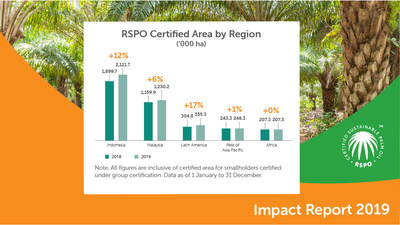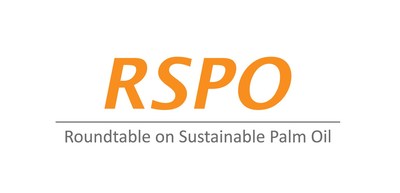RSPO's 2019 Impact Report shows double-digit increase in certified area, uptake, membership, and more.
The Roundtable on Sustainable Palm Oil (RSPO) released it's 2019 Impact Report today, highlighting a significant increase in the uptake of Certified Sustainable Palm Oil (CSPO). The full 2019 Impact Report can be found here.

A total of 7.07 million metric tonnes (MT) of CSPO was purchased by the market, and overall sales increased by 13%, during the reporting period 1 January 2019 to 31 December 2019.
Globally, the total RSPO certified area grew by 9% to 4.2 million hectares (ha) across 17 countries by the end of 2019, with certified palm oil mills producing 15.19 million MT of CSPO and 3.38 million MT of Certified Sustainable Palm Kernel (CSPK), respectively, a 13% and 11% year-on-year increase. Indonesia and Malaysia remain the largest oil palm producing countries, covering a total of 81% of RSPO's total certified area.
The 2019 Impact Report is a special edition, entitled, Reflecting on a Decade of Growth, which documents RSPO's achievements and performance over the past 10 years.
RSPO's incoming Chief Executive Officer, Beverley Postma, said: "It is inspiring to see just how much has been achieved by RSPO members in the span of a decade, and more recently, to see several initiatives being launched that further solidify RSPO's position as the leading sustainable palm oil certification standard. We know there is still a lot of work to be done if we truly are to achieve market transformation. I'm confident that RSPO members throughout the supply chain will work together to increase the uptake of CSPO, deliver positive impacts, and tackle the other challenges and opportunities that may come our way in 2021 and beyond."
The full Impact Report press release can be found here on the RSPO website.
About RSPO:
RSPO is a not-for-profit, international, membership organisation that unites stakeholders from the different sectors of the palm oil industry including oil palm producers, palm oil processors or traders, consumer goods manufacturers, retailers, banks and investors, environmental or nature conservation NGOs, and social or developmental NGOs.

Photo - https://mma.prnewswire.com/
Logo - https://mma.prnewswire.com/

No comments:
Post a Comment